The Vienna Negotiations on Nuclear Power
War Clouds Looming Over Eurasia?
by Anthony J. Hall
The issue of nuclear energy provides the pretext for addressing internationally a fuller array of crises putting Persian civilization once again at a crucial cross-roads in the making of global history. The Islamic Republic of Iran has become a major force in transforming the interface between financial systems and energy markets as the peoples and governments of Eurasia seek to create new forms of regional integration and cooperation by developing alternatives to the US-based petrodollar. These innovations arise in response to the increasingly aggressive agendas of command and control emanating from the tight circle of bankers, Wall Street racketeers, arms merchants, and media manipulators that that have taken control of the Israeli-Americano imperium as well as its subject organizations including NATO and the European Union.
The majority of citizens in the so-called West have been sidelined from any genuine say in guiding the actions and policies of our own governments. The alienation between people and governments has helped remove political obstacles that might otherwise have coalesced to block the rapid escalation of the conditions of permanent and intensifying warfare. The business of war forms the very core of the financial operations of the great Derivative Ponzi Schemes for creating money and debt in by privately-owned central banks. The war business is firing hard on all cylinders right now.
The extent of the sense of alienation felt by average people in our governments in the West is deep and widespread. The alienation is statistically displayed by the turnout rates in the recent US Mid-Term Election. In the autumn of 2014 fully two of every three eligible voters in the United States failed to show up to mark their ballots. Not surprisingly the only real were the Congressional forces of accelerated global warfare.
Where does the money come from to pay for such an immense capacity to destroy all Life on Earth? The huge military budgets are being borrowed from theoretical debt slaves along a theoretical trajectory charting some imagined future.
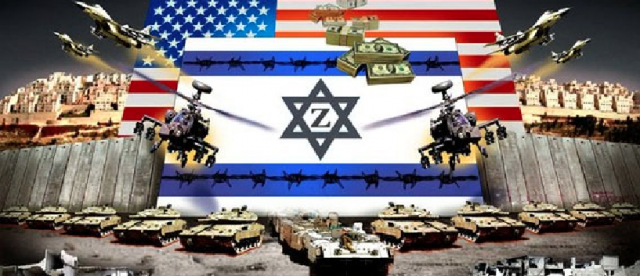
The rapid worldwide growth of militarism has been quick and startling especially on the most extended military frontiers of the war machine of the Israeli-Americano imperium. This military leviathan brings together massive configurations of personnel and weaponry far beyond anything that US President Dwight D. Eisenhower could even have imagined when he warned us in 1961 to beware of the anti-democratic incursions of the military-industrial complex.
How are we to imagine the Chain of Command set in place to direct the most effective mass murder machines ever to exist in all of human history? Those winning the fight to control the heights of Military Command in the Israeli-Americano Imperium are pointing their weapons of mass destruction towards Eurasia. A range of military options are being explored as pressure builds for some sort of cataclysmic invasion of Russia, Iran, and Syria, with China and the other BRICS countries also attracting their share of antagonism.
From a US-Imposed Dictatorship to a Self-Disciplined Islamic Republic
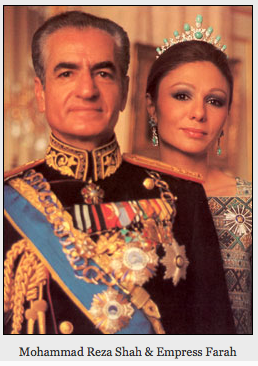 Of all the countries on the Israeli-Americano hit list, Iran has been the most consistently demonized by the Zionist protagonists of the Global War on Terror in all its incarnations. Iran has been targeted again and again in a series of attacks including the foreign-backed overthrow of its governments. With the CIA’s covert removal in 1953 of the elected leader, Mohammad Mosaddegh, the monarchy of the Shah of Iran took on amplified powers to govern on behalf of US interests in the oil-rich economy of Iran.
Of all the countries on the Israeli-Americano hit list, Iran has been the most consistently demonized by the Zionist protagonists of the Global War on Terror in all its incarnations. Iran has been targeted again and again in a series of attacks including the foreign-backed overthrow of its governments. With the CIA’s covert removal in 1953 of the elected leader, Mohammad Mosaddegh, the monarchy of the Shah of Iran took on amplified powers to govern on behalf of US interests in the oil-rich economy of Iran.
Between 1980 and 1988 the Islamic Republic of Iran faced aggressive warfare emanating from the US-backed and armed Baathist regime of Iraqi president Saddam Hussein. This conflagration imposed major hardships on the Iranian state and population.
The intensity of more recent attacks should not be underestimated. The commercial relations of the Islamic Republic of Iran with the outside world have been seriously attacked. Iran has faced Israeli-directed assassinations of its top nuclear scientists. Iranians have had to deal with devastating cyberattacks on the operating systems of their industries, including their nuclear energy industry.
The world is now almost four decades into the Islamic Revolution that overturned in 1979 the reign of Mohammad Reza Shah Pahlavi, King of Iran from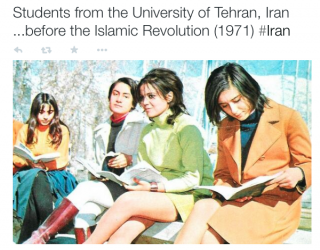 1941 to 1979. The Islamic Revolution of 1979 put in the place of the Shah’s regime a religiously-based government premised on the ideals of the Valayat-e-Faqih, the guardianship of Islamic Jurists. Of course there have been bumps along the way in Iran’s transition from a US-imposed dictatorship to a disciplined republic governed by the popular will of a majority of the country’s citizens acting in the light of Allah’s Grace.
1941 to 1979. The Islamic Revolution of 1979 put in the place of the Shah’s regime a religiously-based government premised on the ideals of the Valayat-e-Faqih, the guardianship of Islamic Jurists. Of course there have been bumps along the way in Iran’s transition from a US-imposed dictatorship to a disciplined republic governed by the popular will of a majority of the country’s citizens acting in the light of Allah’s Grace.
As with most countries, questions arise in Iran about the place of religious and ethnic minorities in a polity where a Shi’a majority is the dominant component of a larger Muslim majority. How do the people and government of Iran treat, for instance, Persian Jews or Azeris or Kurds or Orthodox Armenians or Zoroastrians? Of course tensions between the different groups sometimes occur in ways that test the capacity of Islamic jurists to live up to their high responsibilities of their theocratic guardianship. Their task is rendered less onerous, however, because the ancient bedrock of Persian civilization together with wide linguistic currency of the Farsi language provide a solid basis for a high degree of unity in diversity in one of humanity’s oldest and most well traveled cross-roads of interaction.
Tehran Chronicle: The Islamic Republic of Iran Today
From what I could see with my own eyes during a recent visit to the Iranian capital of Tehran to take part in the New Horizon International Conference of Independent Thinkers and Film Makers, the ongoing Islamic Revolution has become the medium of a well run and orderly society that, though not perfect, is generally meeting the needs of its citizens in spite of the harsh economic warfare directed its way.
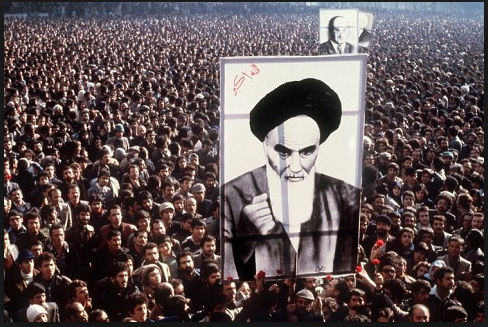
Contemporary Iranian society is guided by the outcome of frequent and vigorously contested elections which do result in significant alterations in public policy. The Islamic Republic devotes considerable public resources to the achievement of universal literacy, broadened accessibility to higher education, and extending the progress of scientific research tied to technological innovation.
Women are well represented in the work place and in institutions of higher learning. The arts and culture, but especially cinematic production, are thriving. In spite of all the concerted efforts to isolate Iran, a country of almost 80,000,000 citizens, Tehran continues its careers as one of the world’s most cosmopolitan cities. Tehran is the capital of a country but it is also the main metropolitan centre of a worldwide community of communities sharing roots in Persian civilization.
Money and Politics in the Isreali-Americano Imperium
There is much more going on in the negotiations on the future of the Islamic Republic’s nuclear energy program than discussion on centrifuges and the extraction of enriched uranium from uranium oxide. The negotiations put Iranian delegates on one side of the negotiating table with delegations from the permanent members of the UN’s Security Council plus Germany on the other.
The irony of putting polities run by leaders who take for granted their control of nuclear weapons is not lost on the Iranian negotiators. They have every reason to know that behind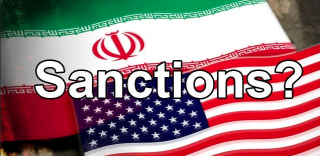 their counter parties in the negotiations is the Israeli government. What is to be said of the effrontery of Israel’s own double standards in making itself master of a large arsenal of nuclear weaponry that remain unacknowledged and thus unregistered in the Treaty of Non-Proliferation of Nuclear Weapons.
their counter parties in the negotiations is the Israeli government. What is to be said of the effrontery of Israel’s own double standards in making itself master of a large arsenal of nuclear weaponry that remain unacknowledged and thus unregistered in the Treaty of Non-Proliferation of Nuclear Weapons.
The current negotiations epitomize a carrot and stick approach. The carrot being held out is the proffered enticement that there will be some easing of the economic warfare, otherwise labeled as “sanctions,” if the Islamic Republic lowers both its existing stocks of enriched uranium as well as its capacity to produce this primary ingredient of both nuclear fuel rods and nuclear weaponry. In spite of much compelling evidence to the contrary, the accusations keep on coming that the leadership of the Islamic Republic is secretly conspiring to develop its own arsenal of nuclear weapons.
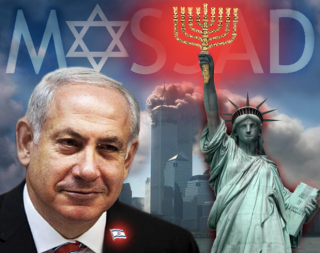 The imposed commercial obstacles to free-flowing trade and exchange are themselves widely portrayed within the neocon leadership of the Israeli-Americano Imperium as some sort of limp-wristed liberal sell out, as the outcome of a terrible Faustian bargain. The Likudnik forces that that have been calling with growing bellicosity for an outright military invasion of Iran have not backed away from this position ever since the US neocon President, George W. Bush, listed the Islamic Republic as part of an “Axis of Evil” following the Israeli-directed 9/11 conflagration.
The imposed commercial obstacles to free-flowing trade and exchange are themselves widely portrayed within the neocon leadership of the Israeli-Americano Imperium as some sort of limp-wristed liberal sell out, as the outcome of a terrible Faustian bargain. The Likudnik forces that that have been calling with growing bellicosity for an outright military invasion of Iran have not backed away from this position ever since the US neocon President, George W. Bush, listed the Islamic Republic as part of an “Axis of Evil” following the Israeli-directed 9/11 conflagration.
No matter how the negotiations turn out, the issues at play will continue to exercise a dominant role in the manoeuvres of dominant political actors especially in Tel Aviv, Washington, and, of course, Tehran. Indeed, quite probably the question of whether or not to mount a military invasion of Iran will figure even more prominently in the upcoming US presidential election if it happens that some compromise resolution is snared from the overheated rhetoric characterizing the current round of nuclear negotiations.
The chief billionaire bank rollers of both the Republican and Democratic parties in the United States, Zionist King pins Sheldon Adelson and Haim Saban, recently made it perfectly clear that any candidate seeking their money to buy their way into both the nominations and then the Chief Executive’s Chair in the White House will have to demonstrate obedience to the Zionist fatwa calling for a violent death to the Shi’a Revolution based in Iran.
As ever so delicately put by Haim Saban, chief financial backer of Hillary Clinton’s run for America’s top job, “I would bomb the living daylights out of the sons of bitches” in Iran.
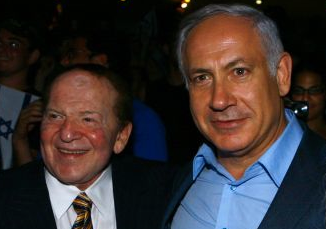
Sheldon Adelson has been even more blunt in his campaign to push the United States into a military invasion of Iran including nuclear attacks. The racketeer-in-chief of gambling casinos in both Las Vegas and Macau, Adelson was the primary financier of Mitt Romney’s campaign in 2012 to defeat Barack Obama. If Romney had become president he would have further entrenched the subordination of the US Armed Forces as Israel’s chief military enforcement agency.
The longtime Republican Party operative, Adelson has been noted for his unrelenting promotion of “bribery, money laundering and Islamophobia.” Prominent among the lobby groups Adelson has sponsored is the Foundation for the Defense of Democracies. This Tel Aviv-based Foundation includes many of the same backers as the Project for the New American Century, the think tank notorious for advocating a year before 9/11 something like a “new Pearl Harbor” as the key to generating increased public support for a quick acceleration of US militarism.
Adelson’s largess helped the Foundation, which specializes in anti-Iranian propaganda, to emerge as leading technicians in Congressional initiatives to advance economic warfare against the Islamic Republic. The Zionist-run Foundation for the Defense of Democracies has sponsored projects like Jonathan Kay’s literary effort to disseminate disinformation aimed at obscuring any highlighting of the very active role of Israeli agents in planning and implementing the 9/11 debacle. http://mediamatters.org/blog/2014/03/31/bribery-money-laundering-and-islamaphobia-the-s/198684
Benjamin Netanyahu, Emperor of the Israeli-Americano Imperium
Is He Wearing Any Clothes?
The leading protagonist of the war agenda of the Israeli-Americano Imperium is Israeli Prime Minister, Benjamin Netanyahu. Netanyahu is the Jewish War Lord of a vengeful Islamophobia catalyzed by the so-called Islamic State. The core target of the military wing of the Jewish state, however is the most formidable state in the region, the Islamic Republic of Iran. Indeed, as evidenced by the contents of his 1979 book, Terrorism: How the West Can Win, Netanyahu developed the primary narrative of the Global War on Terror long before the three World Trade Centre buildings in New York were obliterated at Israeli directive through explosive devices that may include mini-nukes.
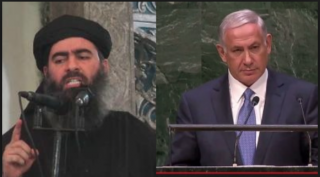
Netanyahu has equated the Islamic Republic of Iran with ISIL recently on CBS News. He said, “militant Islam is led by al-Qaeda and ISIL on the Sunni side even as militant Islam is led on the Shi’a side by Iran and Hezbollah.” http://www.haaretz.com/news/diplomacy-defense/1.626786
Netanyahu warned the US government not to make a deal with the Islamic Republic on its nuclear energy program. “Iran is not the friend of America,” proclaimed the leader of the Jewish state. “Iran is America’s enemy.”
The possibility that the US President, Barack Obama, will move towards some sort of normalization of relations with the Islamic Republic of Iran clearly haunts neocon extremists such as Benjamin Netanyahu. The neocon concern is becoming palpable that anti-Iranian scare tactics are being rendered ineffective especially in light of the Quds special forces unit of the Iranian Revolutionary Guards joining in the coalition of nations fighting ISIL. This concern was expressed in a Weekly Standard editorial entitled, “Ditching Israel, Embracing Iran.” In it Lee Smith writes,
Don’t worry, Obama told Israel: I’ve got your back. I don’t bluff. The Iranians won’t get a bomb. And besides, the real problem in the region, the White House said time and again, is Israeli settlements. It’s the lack of progress between Jerusalem and Ramallah that destabilizes the region. As John Kerry said recently, the stalled Arab-Israeli peace process is what gave rise to the Islamic State.
From the White House’s perspective, then, Israel is the source of regional instability. Iran, on the other hand, is a force for stability. It is a rational actor, Obama has explained, pursuing its own interests. The White House, moreover, shares some of those interests—like rolling back the Islamic State.
The fact that Quds Force commander Qassem Suleimani now calls the shots in four Arab capitals—Beirut, Damascus, Baghdad, and Sanaa—makes him the Middle East’s indispensable man. Compared with the one-stop shopping Obama can do in Tehran to solve his Middle East problems, what can Israel offer?http://www.weeklystandard.com/articles/ditching-israel-embracing-iran_817766.html
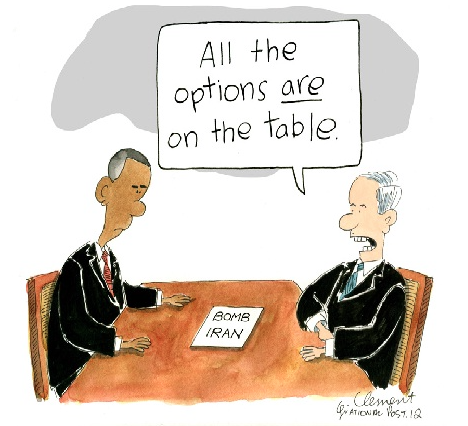
Iran in US Presidential Politics, 1980 and 2016
There is a major precedent for the prospect that the politics of Iranian-US relations could become a major factor in the presidential elections of 2016. Negative public perceptions of the White House’s handling of the hostage crisis in Tehran beginning on November of 1979 played a big part in holding Jimmy Carter to a one-term presidency and ushering in the era of US President Ronald Reagan. Reagan’s neocon legacy has remained a significant factor in the political culture of the Israeli-Americano Imperium right up to this day.
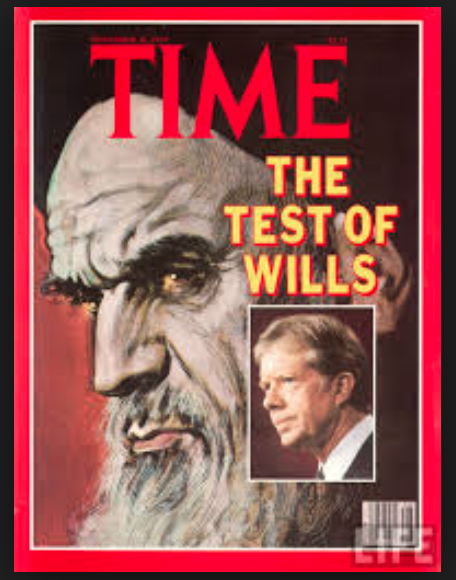 University students in Tehran helped express the prevailing popular sentiments of the Islamic Revolution that ushered in the civil and spiritual authority of Iran’s first Supreme Leader, Ayatollah Ruhollah Mostafavi Moosavi Khomeini. The students captured 52 American personnel in taking control of the US Embassy in Tehran. This edifice, which is currently a Museum known was the Den of Spies, was discovered in 1979 to be the site of an elaborate base for CIA operations in the larger region.
University students in Tehran helped express the prevailing popular sentiments of the Islamic Revolution that ushered in the civil and spiritual authority of Iran’s first Supreme Leader, Ayatollah Ruhollah Mostafavi Moosavi Khomeini. The students captured 52 American personnel in taking control of the US Embassy in Tehran. This edifice, which is currently a Museum known was the Den of Spies, was discovered in 1979 to be the site of an elaborate base for CIA operations in the larger region.
The hostage taking rapidly became the most intensely covered international story of its era and a major factor in the formation of US public opinion in the campaign cycle leading to the presidential elections of 1980. In April of that year President Jimmy Carter watched the failure of a helicopter operation he had ordered into existence. The plan was to pluck the hostages away from the captivity of their custodians.
The fate of the hostages became the primary deciding factor in the US presidential election of 1980. Much evidence points to the probability that the Isreali government led by Prime Minister Manachem Begin exploited the hostage crisis to advance his own Likudnik policies.
A founder in 1973 of the right-wing Likud Party, Begin had emerged from the ranks of the most militant extremists of Zionist terror directed at unhinging the UK from the governance of Palestine before 1947.
Begin’s terrorist group, the Irgun (Etzel), joined the Stern Gang (Lehi) in breaking away from the Zionist paramilitary force, the Haganah. The current leader of the Likud Party, Israeli Prime Minister Benjamin Netanyahu, is a unrelenting proponent of Israeli expansionism. Netanyahu has inherited the extremist legacy of Menachem Begin.
Irgun’s most notorious operation was the blowing up in 1946 of the British administrative headquarters at the King David Hotel in Jerusalem. This action became a kind of textbook illustration of how to influence international media coverage through an act of calculated violence. The explosion killed 91 random victims.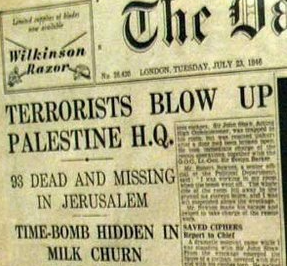
The Zionist bombing of the King David Hotel helped confirm in the subsequent evolution of Israel’s orientation to the international community the crucial importance of terrorism, but especially false flag terrorism, as a malleable instrument of geopolitical manipulation.
Begin’s decision to bomb the King David Hotel helped establish patterns of extremism reflected in a series of false flag terrorist events aimed at turning public opinion against Israel’s predominantly Muslims enemies. These bombings include series of episodes carried out in 1954 when Israeli agents blew up a number of targets in Cairo and Alexandria in machinations designed to prevent an Egyptian takeover of the Suez Canal. In 1967 the USS Liberty, an American spy ship sitting off the Sinai coast in the Mediterranean Sea, was attacked from air and water by Israeli Armed Forces during the Six Day War. Thirty-four members of the US Navy were killed and 172 wounded in this Israeli attack on an American war ship.
The Israeli role in the attacks of 9/11 transgressed new frontiers of subversive audacity in an event carefully staged managed to transform Israel’s regional enemies into the global enemies of the so-called West. The military establishments of these countries of the so-called West were given a replacement enemy, the CIA’as creation al-Qaeda, to replace the hostile role formerly assigned the now-defunct Soviet enemy. In the post-9/11 era the unchallenged head of the Israeli-Americano Imperium became Benjamin Netanyahu. It was Netanyahu himself who played a major role in speciously defining the so-called West as a Judeo-Christian polity. This definition treated Islam as an aberrant intrusion on the so-called West rather than an important contributor to the genesis of Western civilization going back to the integral role of the Muslim caliphate Al-Andalus in the European Renaissance.
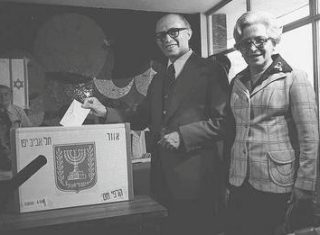
Along the way to and beyond 9/11 the Israeli Mossad has worked closely with a group of Iranian dissidents that identify themselves as the Majahedin e Khalq. Under Israeli direction the MeK has conducted many attacks on the Islamic Republic including the murdering of nuclear scientists, assaults on Iranian embassies and consulates as well as providing help in disseminating Israeli disinformation concerning Iran’s nuclear energy program.
Likud, Begin’s consolidation of right-wing parties, took power in the Israeli Knesset in 1977 anticipating a more general right-wing assault on the heritage of social democracy and the New Deal throughout the so-called Western World. The transformation of Israel from a country whose socialist heritage was embodied in a proliferation of agricultural co-ops known kibbutzim, to a country characterized by the expansionary militance of Jewish settlers on the West Bank of the Jordan River anticipated a more general trend. It anticipated a move away from the social welfare state to the warrior state, the stock market state. This transition from a mixed economy to the military Keynsianism of a corporate kleptocracy would be promoted most aggressively in the 1980s by the governments of US President Ronald Reagan and British Prime Minister Margaret Thatcher.
Begin’s Likud Party helped bring forward into contemporary times the aspirations of Irgun and Stern gang to expand the Jewish state’s territorial base from the Suez Canal to the Persian Gulf in the name of “Greater Israel” or Eretz Yisrael Ha-Shlema. In order to hold true to this agenda of expansionism Prime Minister Begin had to stand up to the effort of US President Jimmy Carter at a thirteen-day meeting at Camp David in 1978 aimed at pressuring the government of Israel to recognize a Palestinian state on territory captured by the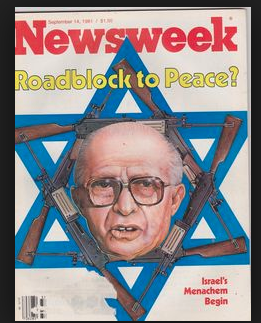 Israeli Defense Force in 1967.
Israeli Defense Force in 1967.
Begin succeeded in holding out against the pressure brought to bear by US President Jimmy Carter to sanction the founding of a Palestinian state on part of the territory specifically apportioned for this purpose by the UN General Assembly in 1947 in Resolution 181. By this time Begin was deeply committed to a rapid increase in the number of Jewish settlements on the West Bank, a expansionary process that would be accelerated once Ronald Reagan took control of the US executive branch.
Begin deftly diverted the impetus for a binding agreement on a Palestinian state to a transfer back to Egypt of the portion of the Sinai Peninsula captured by the IDF in 1967. This transaction resulted in a joint awarding of the Nobel Peace Prize to Menachem Begin and Egyptian President Mohamed Anwar al-Sadat in 1978.
Begin’s encounter with US President Jimmy Carter at Camp David heightened the Israeli prime minister’s resolve to see a transfer of the White House away from the Democratic Party to the Republican Party led by Ronald Reagan. There is considerable evidence that key operatives in Reagan’s campaign team staked out with covert Israeli assistance a bargaining position in the hostage crisis whose outcome, it was widely understood, would be the deciding factor in the US presidential election. The covert negotiations took place in Paris and Madrid between agents of the Islamic Republic and agents of presidential candidate Ronald Reagan. This secret deal making revolved around Reagan’s campaign manager and future director of the CIA, William Casey.
The fact that the campaign team of Ronald Reagan stole the hostage negotiations away from Jimmy Carters’s White House was demonstrated by the fact that the captives were cleared to take off from the Tehran airport only minutes after the commencement of President Ronald Reagan’s inaugural ceremony. The nature of the quid pro quo in determining this outcome would be demonstrated in later years when it became known that the administration of Ronald Reagan agreed to sell arms to the Islamic Republic through Israeli intermediaries.
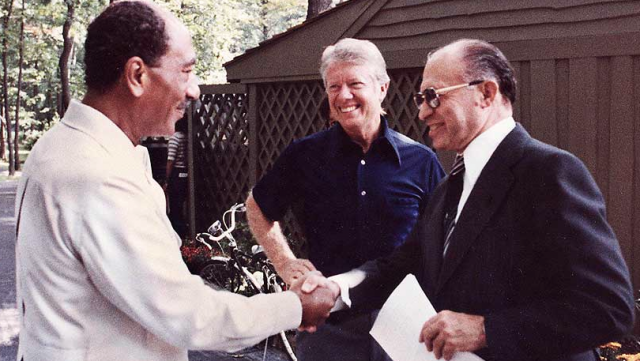
Some of the money acquired in this transaction was used to fund covertly the US-backed proxy army, the Contras, in their efforts to overthrow the Soviet-backed government of Nicaragua. A related feature of the so-called Iran-Contra scandal was the partial exposure of the subterranean banking transactions at the Saudi-funded, Pakistani-based Bank of Credit and Commerce International (BCCI), a commercial institution active in 78 countries including the USA.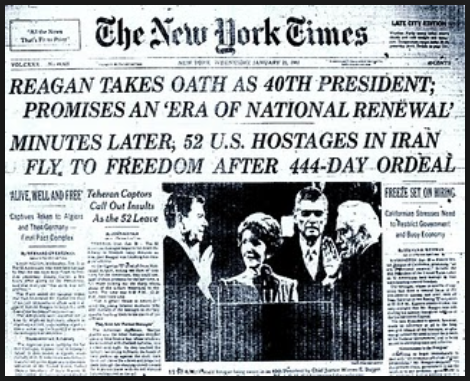
Begin’s encounter with US President Jimmy Carter at Camp David heightened the Israeli prime minister’s resolve to see a transfer of the White House away from the Democratic Party to the Republican Party led by Ronald Reagan. There is considerable evidence that key operatives in Reagan’s campaign team staked out with covert Israeli assistance a bargaining position in the hostage crisis whose outcome, it was widely understood, would be the deciding factor in the US presidential election. The covert negotiations took place in Paris and Madrid between agents of the Islamic Republic and agents of presidential candidate Ronald Reagan. This secret deal making revolved around Reagan’s campaign manager and future director of the CIA, William Casey.
Beginning with the funding by William Casey’s CIA of the US-financed and armed Islamic proxy army that would overthrow the Soviet-backed puppet regime in Afghanistan, the BCCI was a primary agency in the financing and arming of Muslim assets and patsies whose image as terrorists became essential to the operation of the Israeli-Americano Imperium. This concoction, manipulation, and exploitation of the imagery of Islamic Terror would enter a new phase of importance when the privatized terror economy was ushered into prominence by the events of 9/11.
The intense Israeli-driven propaganda devoted to misrepresenting the role of nuclear industry in Iran holds out the prospect of some sort of cynical replay of the covert manipulation of the US hostage drama in Tehran as a means of advancing the right-wing extremes of the dominant war party in the Isreali-Americano Imperium.
The reactionary character of this effort to derive political leverage from the demonization of the Islamic Republic’s leadership was well exemplified in Canada’s intervention at the United Nations in November of 2014 in a way that included the replication of Benjamin Netanyahu’s propaganda strategy. Like Netanyahu, the Canadian delegation at the UN equated the deprivations of ISIL with the human rights record of the Islamic Republic just days before the culmination deadline of the nuclear negotiations in Vienna. http://www.canadainternational.gc.ca/prmny-mponu/canada_un-canada_onu/statements-declarations/ambassadors-ambassadeurs/20141030_PPHR-PPDP_Rishchynski.aspx?lang=eng
Orientalism Then and Now in Manipulating Western Attitudes Towards Islam
The likelihood that Israeli agents played a decisive role in exploiting the US hostages as pawns in their bid to replace Carter with Reagan in the US White House has been documented by investigative reporter Robert Parry. Parry is credited with doing much of the groundwork that laid the bias for the revelations that created the Iran-Contra scandal in 1985-86.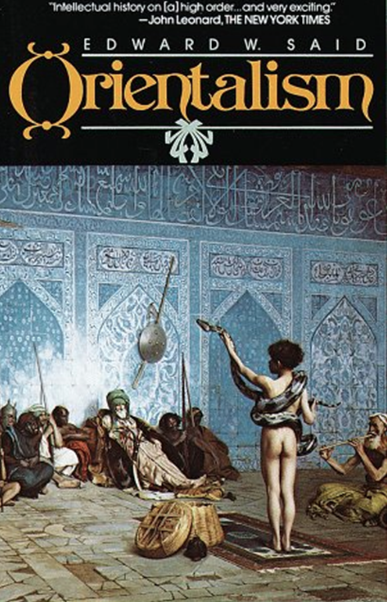
Parry highlights the role of Israeli agent Steven Emerson in the specious effort to debunk in the early 1990s the very credible thesis that the Reagan campaign team received Israeli help in using the hostage drama in Tehran to secure the US presidency in the US election of 1980. Emerson has been prominent in the mounting efforts in the 1990s to build up the psychological basis of American Islamophobia, a key instrument in the manipulation of domestic public opinion in the Israeli-Americano Imperium.
As chronicled by the Palestinian-American scholar Edward Said, the roots of this imperial manipulation of Western attitudes toward Islam go back to the Orientalist fantasies governing interventions in the Middle East in the nineteenth century. In the era of the Cold War the dominant side accelerated efforts to direct and exploit Islamic factionalism in a contest where religion was seen as a weapon to block the spread of Godless communism. Clearly the effort to exploit Islam as an instrument of command and control in the expansionary machinations of the Israeli-Americano Imperium have become even more intense as the Jewish state seeks to replace the United States as the world’s dominant polity.
What role might be assigned to ISIL now that Benjamin Netanyahu has announced the onset of “the Battle for Jerusalem, our eternal capital.” Netanyahu’s declaration of war seems directed at formalizing the already advanced processes of displacing Palestinians from East Jerusalem, otherwise known as East al-Quds, through the building of yet more Israeli settlements on the most contested grounds of the Occupied Territories. This push is occurring as Jewish voices are raised, including that of Israeli Housing Minister Uri Ariel, anticipating the demolition of the Al-Aqsa mosque in preparation for building the Third Jewish Temple on Temple Mount.
This kind of provocation was met with pushback from displaced Palestinian who attacked a synagogue in what is likely to become a new Intifada. The Israeli government retaliated by pushing down Palestinian homes inflaming the sensibilities of many Muslims around the world. This trend of violence and recrimination will inevitably heighten the tensions between the Jewish state and the Islamic Republic in ways that will test the internal coherence of the Israeli-Americano Imperium. These developments on the most contested religious soil in the world will capture the momentum in a fast-breaking sequence of events of which the Vienna negotiations on nuclear power form only a part.
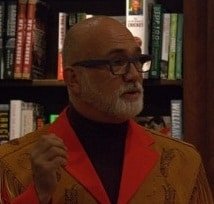
Anthony Hall is a Professor of Globalization Studies at the University of Lethbridge in Alberta Canada where he has taught for 25 years. Along with Kevin Barrett, Tony is co-host of False Flag Weekly News at No Lies Radio Network. Prof. Hall is also Editor In Chief of the American Herald Tribune. His recent books include The American Empire and the Fourth World as well as Earth into Property: Colonization, Decolonization and Capitalism. Both are peered reviewed academic texts published by McGill-Queen’s University Press. Prof. Hall is a contributor to both books edited by Dr. Barrett on the two false flag shootings in Paris in 2015.
Part II was selected by The Independent in the UK as one of the best books of 2010. The journal of the American Library Association called Earth into Property “a scholarly tour de force.”
One of the book’s features is to set 9/11 and the 9/11 Wars in the context of global history since 1492.
ATTENTION READERS
We See The World From All Sides and Want YOU To Be Fully InformedIn fact, intentional disinformation is a disgraceful scourge in media today. So to assuage any possible errant incorrect information posted herein, we strongly encourage you to seek corroboration from other non-VT sources before forming an educated opinion.
About VT - Policies & Disclosures - Comment Policy



